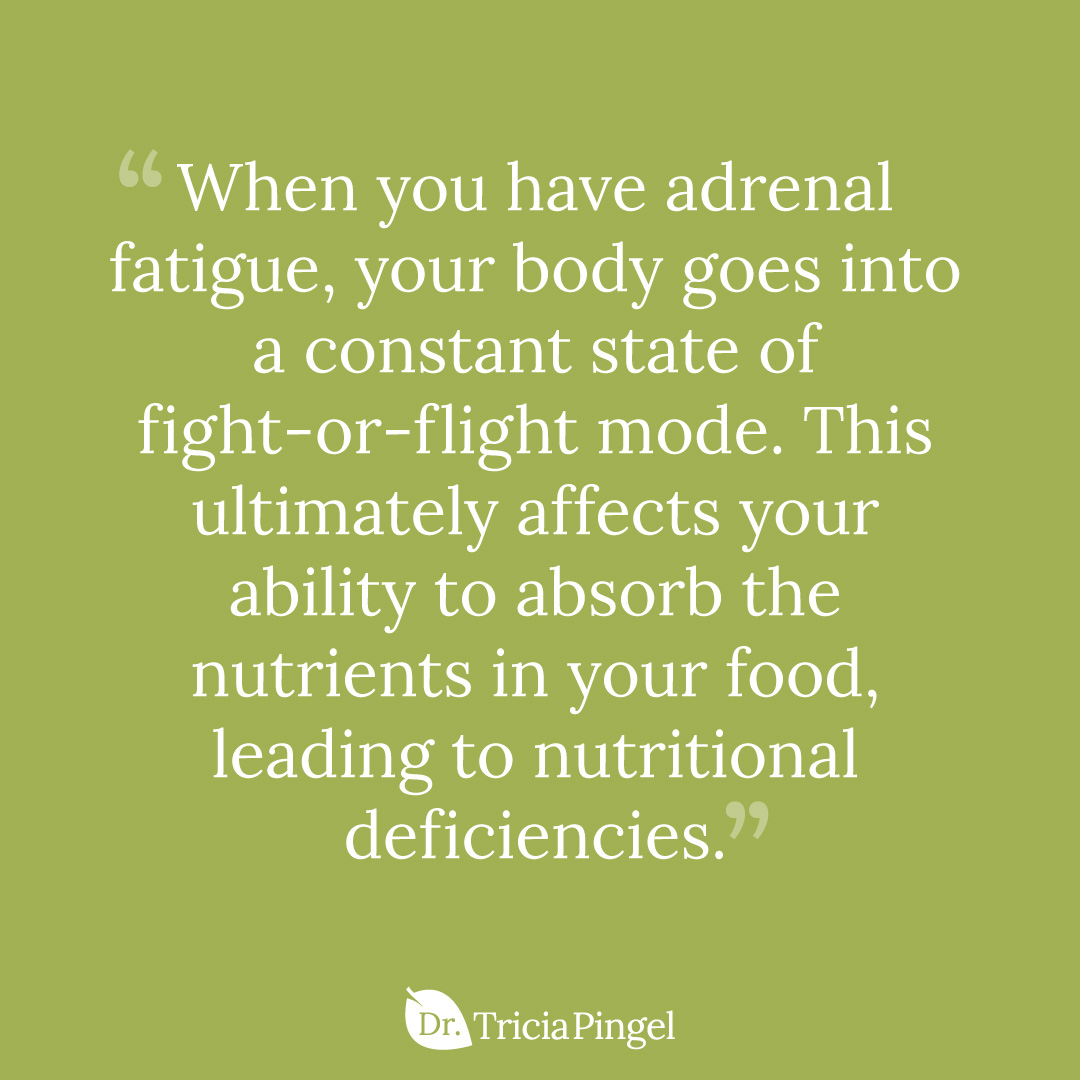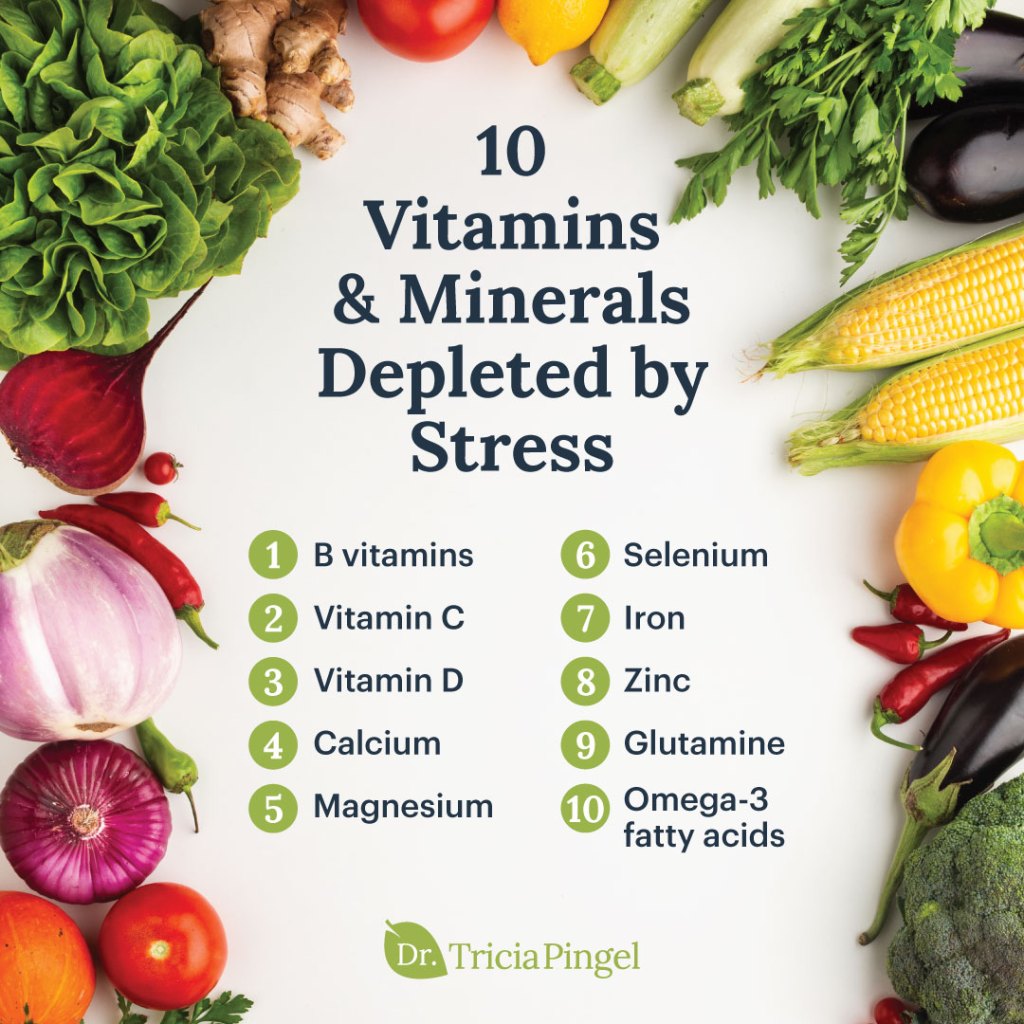Let's talk about the best foods for stress! One of the lesser-known effects of chronic stress (and the resulting adrenal fatigue!) is its ability to prevent your body from absorbing the nutrients you should be getting from your food. And this leaves you at risk for nutritional deficiencies.
Why does this matter? It matters because you need vitamins and minerals for energy, rest, proper cognitive function, overall wellness, and for your entire body to function properly. Simply put, nutrition and stress management are key to your health and well-being.
That's why you need to make sure you're eating certain foods for stress—foods rich in the nutrients your body is naturally depleting, especially during times of extreme stress.
In fact, I remember that when I was suffering from a bout of adrenal fatigue after I lost my mom, clumps of my hair were falling out. I would almost pass out after riding a roller coaster. My mood was indifferent and I was far too thin. I was too exhausted to keep up with my kids. I was so stressed, and the resulting adrenal fatigue was causing me to be malnourished—preventing my body from absorbing nutrients I needed from my food.
Does any of this sound familiar? If you, too, are experiencing symptoms like these, I urge you take a look at your nutrition and stress management and consider not only how how they may be linked but also how eating more foods for stress could benefit your overall health.
So, let’s discuss most important vitamins and minerals impacted by adrenal fatigue and review some of the best foods for stress. It’s time to reclaim your health and live your best life again!
I always refer to adrenal fatigue as a nutrient thief because that’s exactly what it does—it steals the nutrients your body needs to thrive and be well. But how do chronic stress and adrenal fatigue prevent you from being adequately nourished? Let’s take a closer look at the physiology behind this connection.
So, we’ve discussed that in order to achieve true health, your body needs to be able to fully absorb the nutrients in your food. Here’s the problem: When you have adrenal fatigue, your system goes into a constant state of fight-or-flight mode. This ultimately affects your ability to absorb nutrients from the foods you eat, leading to nutritional deficiencies.
Considering that your adrenal glands function as your body’s control center, is it any surprise to learn they also regulate much of your body’s nutrients? Your adrenal glands require sufficient nutrients not only to function, but also to control electrolyte and mineral balance. But they also manage how your body uses nutrients to regulate your thyroid, sex hormones, neurotransmitters, blood sugar, and blood pressure. It’s a catch-22.
Imagine a manufacturing assembly line. There are several individual parts arranged in a specific order to produce a final product. Well, think of the individual parts as nutrients and the final product as your body’s ability to function properly. For example, you may know that vitamin B12 helps your body produce energy, and that’s a crucial part of your well-being. But it’s important to also recognize how your body absorbs and utilizes vitamins and minerals. Here’s why.
Let’s take a look at an example involving the neurotransmitter serotonin. Your body must have adequate amounts of both vitamins C and B6 to produce serotonin, a hormone related to your mood, appetite, memory, sleeping habits, and more. If you have adrenal fatigue, you will likely be deficient in these nutrients, meaning all of these important functions will be impacted. In fact, one study revealed that participants with low levels of vitamin B6 were more likely to experience symptoms of depression. Furthermore, the researchers hypothesized that vitamin B6 supplementation may help improve these symptoms. [1]
So, how do you counteract this? By replacing processed, innutritious foods with foods containing vitamins B6 and C, you’ll better support your adrenal glands during times of stress and support those important functions. (And as a bonus, eating vitamin-rich foods is a great alternative to using antidepressant drugs full of side effects!)
This is just one example of how understanding the connection between nutrition and stress management, and particularly the nutritional impact of adrenal fatigue, is critical not only for healing your adrenal glands, but also for resolving your symptoms.

The nutrients your body needs to remain healthy are broken into two categories: vitamins and minerals. And all vitamins and minerals fall into one of two categories: water soluble and fat soluble.
Fat-soluble nutrients are harder for your body to break down, so they have a higher risk of causing toxicity in your body. Alternatively, if you consume too many water-soluble nutrients, they will simply be eliminated through your urine and have a low risk of causing an overdose. Water-soluble vitamins include all of the B vitamins, vitamin C, and most minerals. (Note: Some minerals, such as iron, are water soluble but can cause toxicity. So, be sure to discuss any new supplements with your physician.) Fat-soluble vitamins include vitamins A, D, E, and K.
Your body utilizes each of these vitamins and minerals to cause a physiological response, such as releasing estrogen or stimulating your thyroid. Here’s where a problem can arise: Your body can’t effectively make hormones, for example, without adequate amounts of vitamins and minerals. So, when you’re nutrient deficient, your body will adapt and divert nutrients to where they are needed most. This is exactly what happens in times of stress. When you’re faced with a stressful situation, the nutrients you have on hand are utilized to deal with the stress, leaving your hormone production behind to struggle. The result? You begin to develop hormone-related symptoms.
So, let’s use your thyroid as an example. Your thyroid requires the mineral iodine to function. But if your body is lacking in iodine, it will either will find an alternative for energy production in place of your thyroid or it will shut down the function of your thyroid altogether! In fact, numerous studies have shown that an iodine deficiency has been linked to an increased likelihood of developing thyroid disorders. [2]
Alternatively, your body could pull iodine from another place within your body (if its available) to resume thyroid production, or it could simply shift focus and start a different process in your body. Crazy, right? Remember, your body is like a map—containing many “routes” full of freeways and overpasses and exits. Any detour on the road will still get you to the same destination; it may take an alternate route to get there. Your body is no different!
Now that you know how nutrition and stress management are related, here are the primary nutrients impacted chronic stress and the resulting adrenal fatigue.

People often ask whether nutritional deficiencies occur because of adrenal fatigue or cause adrenal fatigue. The answer is: both are true. How? Well, if your body can’t do what it needs to do, it becomes stressed. Likewise, if your body has experienced years of constant external stress, it loses nutrients due to both malabsorption and pathway overstimulation utilize leftover nutrients. It’s another catch-22! And this is yet another reason why understanding the link between nutrition and stress management and eating the best foods for stress are so critical. It is a perpetual hamster wheel that can seem impossible to jump out of!
The good news? Regardless of the cause, the treatment involves replenishing lost nutrients by eating top foods for stress and providing additional support for the pathways in your body currently being affected.
The great news here is that you can support your body’s response to stress by prioritizing your nutrition and stress management and eating the best foods for stress management. Here are four ways to do just that!
When you’re focusing on your nutrition and stress management, one of the most important things you can do is to eat a diet rich in nutrients that will support your adrenal gland health. After all, remember that your adrenal glands are your body’s control center. That's why eating foods for stress is so important!
Focusing on plant-based foods is a great place to start. I recommend filling your plate with at least 75 percent plants, as they offer the most nutrients. And studies have shown that eating a nutrient-rich diet supports both your body’s ability to adapt to stress and its ability to minimize the effects of stress. [3]
For a list of the most nutrient-rich foods you can eat to support your nutrition and stress management, click here. But if you're looking for a quick cheatsheet, here are some of my top foods for stress management:
And if you find you’re experiencing any stress-related digestive difficulties, you may want to try specific digestion-promoting herbs or even apple cider vinegar. Keep in mind that your ability to digest your food is critical for your body to adequately absorb nutrients and support proper stress management.
To aid both your nutrition and stress management, you’ll need to consider additional nutritional support. Remember, your stress levels impact both the availability and absorption of your nutrients.
In addition to taking adrenal-supporting herbs, you’ll also want to consider the following:
Depending on your current level of fitness, you have a wide variety of exercises to choose from when you’re looking to support both your nutrition and stress management. The following exercises have been shown to support stress management:
And here are some additional fun ways to help relieve stress as well, because you should enjoy regaining your health.
We’ve discussed how nutrition and stress management are linked and specifically how stress and adrenal fatigue can rob your body of the nutrients it needs to function. So, learning how to have some down time and relieve your stress is key for supporting your overall health and well-being.
If you’re looking for ways to enhance the mind-body connection, I suggest journaling or meditating to help you become centered and calm. You can also try to reframe any negative situations you may be dealing with by making a list of the things you love most about yourself for an instant pick-me-up. Just remember to take some time for yourself and focus on the best parts of your life. The bonus? While doing so, you know you’re on your way to a healthier, happier you!